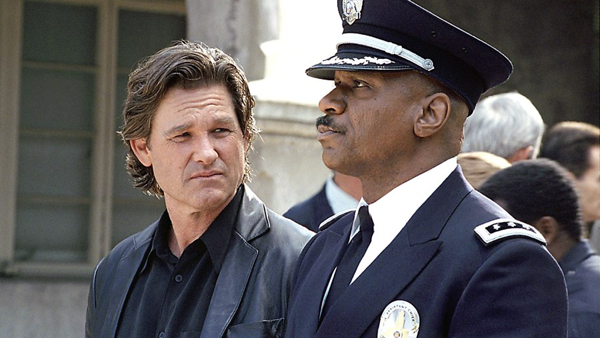Movie review by Greg Carlson
Ron Shelton’s “Dark Blue” looked good on paper: screenwriter David (“Training Day”) Ayer adapting James Ellroy’story, Kurt Russell and Ving Rhames showing off their chops, the clever premise of setting the action against the 1992 verdict announcement in the trials of the cops who bludgeoned Rodney King. The premise, however, is much sweeter in theory and on paper than it is unspooling on the big screen. “Dark Blue” wallows in the formula it had hoped to transcend, laughably careening well-past plausibility inside its first five minutes. Filled to overflowing with convenience, coincidence, and cliché, “Dark Blue” is obvious, leaden and bordering on nonsensical.
Kurt Russell, as the vile, racist Sgt. Eldon Perry Jr., plays the top half of the tired veteran/rookie team-up endemic to the genre. Goofy Scott Speedman, never able to control his greasy golden mane with the same kind of skill Russell demonstrates with his outrageous conk, slack-jaws it as the wide-eyed innocent hard pressed to keep up with his elder partner and the kind of demented street justice favored by the honchos who run the LAPD’s Special Investigations Squad. At the shooting board hearing that kicks off the movie, Russell sums up the moral ambiguity that is his raison d’etre: “At the end of the day, the bullets are in the bad guys and not us.”
Previews for the film suggested that Ving Rhames would factor as a central figure in the narrative, but his by-the-book Assistant Chief Arthur Holland is such a straight arrow (you never see him out of uniform), the filmmakers seemed to have no idea what to do with the character, opting most of the time to simply ignore him. By the time a last-ditch effort to humanize the chief drops out of the sky in the form of a five-year old extramarital tryst, the Perry plotline has consumed the lion’s share of the movie’s attention, and the audience is impatient to return to Russell’s corrupt gun-slinging.
Director Shelton, who has shown a flair for vibrantly-sketched characters in the past, unfortunately doesn’t have the time to fully explore the relationships Russell and Speedman have with the women in their lives. Lolita Davidovich is excellent as Perry’s fed-up wife – she makes the most of her limited screen time and really delivers the goods in a solid scene where Perry makes her read aloud the letter she had intended him to find once she had already left. More problematically, Speedman’s character is sleeping with Holland’s assistant, Sgt. Beth Williamson (Michael Michele) primarily because it seems to serve the plot by linking the good cops and the bad cops.
Naturally, the movie’s climax corresponds to the rioting and looting that occurred in the wake of the verdicts in the King beating trial being read, and Perry is caught in the eye of the hurricane in South Central. Using his car like a battering ram, he navigates through a surreal tableau of smoke and fire, threatening to use his pistol any time the angry mob gets too close. It is a bravura set-piece, which makes it such a shame that the movie that led up to it amounts to nothing. As visually impressive as it is (a CG wide-shot of the city on fire notwithstanding), “Dark Blue” fails to convince us that it deserves even the kind of guarded praise afforded other recent cop movies like “Training Day” and “Narc.”
